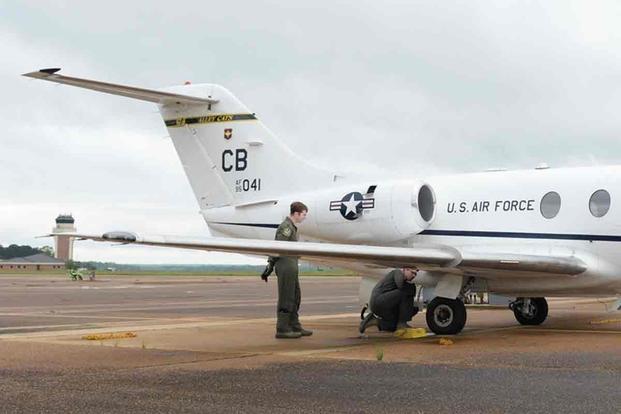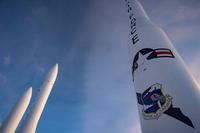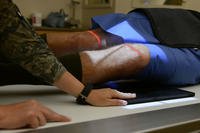Mississippi lawmakers are pleading with Air Force officials to keep the aging T-1A Jayhawk, a training jet that has been around for more than 30 years, in service as the Pentagon hopes to replace the aircraft with flight simulation instead.
A letter sent Monday to Air Force Secretary Frank Kendall from U.S. Sens. Roger Wicker and Cindy Hyde-Smith, as well as U.S. Reps. Michael Guest and Trent Kelly, all Mississippi Republicans, said delays in new flight simulators and new training aircraft means the planned retirement of T-1As could cause issues for pilots.
"Once the T-1A is divested, prospective mobility pilots will spend much of their training time in simulators and less time flying prior to graduation, a posture that forces significant reliance on the timely maturation of the simulated environment," the lawmakers wrote. "If these technologies do not mature on schedule, the Air Force will lose any ability to effectively train pilots in a 'like-aircraft' to which they will be assigned post-graduation."
Read Next: Air Force Under Secretary Jones, an LGBTQ Trailblazer, Is Stepping Down
The T-1A is used at Columbus Air Force Base, Miss.; Laughlin Air Force Base and Randolph Air Force Base in Texas; and Vance Air Force Base, Oklahoma, according to an Air Force fact sheet. It is also used by the Navy at Naval Air Station Pensacola, Florida.
The Air Force was hoping to phase out many of it T-1A training aircraft this year, around the same time as the new T-7 Red Hawk training jet was set to be delivered. But as delays mount for the new replacement jet, Mississippi lawmakers are concerned that the service will be too hasty in retiring the T-1A before a suitable replacement is in place.
"Given the recent media reports of further delays in the T-7A program, the T-1A may be the best defense against unforeseen shortfalls that may adversely affect the pilot training pipeline," the lawmakers wrote. "We request that you consider delaying the divestiture of the T-1A, and remain willing to work with you and others in the Air Force to support you in this endeavor."
Software issues and ejection seat concerns are causing delays in getting the new aircraft to pilots. That means the service will have to rely on older trainers, such as the T-1 and T-38C Talon, in the interim.
Maj. Alli Stormer, a spokeswoman for the Air Force, told Military.com late last year that the new trainer still is in the testing phase.
"The technical challenges the Air Force has identified relate to flight control software and the escape system," Stormer said this past December. "All flight control software issues to date have been resolved and will be tested in flight in the first quarter of 2023. The Air Force is working to correct some escape system deficiencies found during initial testing in late 2021 and will resume escape system testing in the first quarter of 2023."
Boeing was awarded a $9 billion contract to build the T-7 in 2018, with plans to have the first planes delivered by 2023.
In 2019, Air Education and Training Command created a new curriculum relying heavily on a simulator-only course for student pilot training and later announced plans to downsize its fleet of 178 T-1 trainers.
The plan is to phase out the T-1 aircraft altogether at Specialized Undergraduate Pilot Training locations between fiscal 2023 and 2025, Military.com previously reported.
Since 1992, when it first entered service, the T-1 has had two Class A mishaps -- the term used by the military to describe the deadliest or costliest crashes.There have been no pilot deaths in the aircraft, according to the Air Force Safety Center.
The other training aircraft, the T-38, has seen more fatal incidents in its 62-year service history. Since 1960, there have been 211 Class A mishaps, according to the Air Force Safety Center data. There have been a total of 86 pilot deaths and 149 fatalities in total for the T-38.
The T-38C has also been involved in several recent mishaps this past year at Columbus AFB in Mississippi.
This past November, an Air Force pilot's landing gear failed, forcing the plane to skid on its belly across a runway before coming to rest. There were no injuries.
Two weeks before that incident, an instructor pilot had to eject from his jet when it was "rendered inoperable and unrecoverable upon initial takeoff," Col. Jeremy Bergin, Columbus Air Force Base vice wing commander, told reporters.
In that incident, two T-38Cs took off, each with one person, an instructor, aboard. They were flying in a formation when one of the jets experienced the malfunction.
The jet crashed at a private property about 30 minutes south of the base. The instructor was taken to a nearby hospital and there were no fatalities, according to a press release.
-- Thomas Novelly can be reached at thomas.novelly@military.com. Follow him on Twitter @TomNovelly.
Related: Air Force to Cut Use of Jayhawk Trainer, Rely More on Simulators














